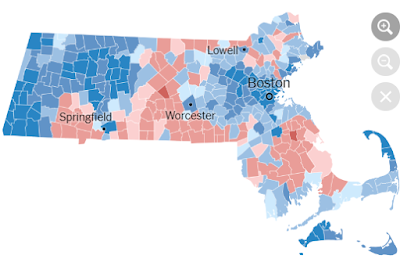Massachusetts yielded few if any surprises. Governor Baker and Senator Warren both convincingly won reelection. Democrats increased their super-majority in the state legislature. Politically, the state will look much the same as it did before.
All of the below graphics are courtesy of NYTimes.com
Governor
| Candidate | Party | Votes | Pct. |
|---|---|---|---|
| Charlie Baker* | Republican | 1,781,982 | 66.8% |
| Jay Gonzalez | Democrat | 886,281 | 33.2 |
As we can see, Baker ran up his totals all over the state with the exception of the Connecticut Valley and immediate Boston suburbs. Indeed Gonzalez only won in Boston by 1 point, an impressive showing for a Republican. Baker also won in the urban centers of Worcester, Springfield, Lowell and Fall River. Even very liberal western Mass was split about evenly.
Baker won for the following reasons:
- Although a Republican, he is a "Never Trumper" and has rather progressive social perspectives, This inoculated him from the Blue Wave that swept the GOP away in many parts of the nation and affected the GOP downticket in Massachusetts. Gonzalez tried numerous times to tie Baker to Trump, but the voters clearly were not buying it.
- Gonzalez's campaign was chronically underfunded and could not make the media buys necessary to get his message out.
- The Democratic party machinery in the legislature and in local government who play well with Baker, either were silent or quietly supported Baker.
- The state's economy is perceived to be strong. No massive cry from the citizenry for change - steady as she goes with the same team.
- Look for Baker to keep the same "go along, get along" and managerial-focused track for his second term. Should he run for another term in 2022 Baker is likely to draw a much stronger challenge from an ambitious Democrat who may wish to parley the Governor's seat into a springboard for a presidential run. Yes, I am thinking of Attorney General Healy and Reps Moulton and Kennedy. Or they will slug it out if Senator Markey retires, but I digress...
US Senate
| Candidate | Party | Votes | Pct. |
|---|---|---|---|
| Elizabeth Warren* | Democrat | 1,634,213 | 60.4% |
| Geoff Diehl | Republican | 979,507 | 36.2 |
| Shiva Ayyadurai | Independent | 91,732 | 3.4 |
Senator Warren's win over Geoff Deihl is almost the mirror opposite of Baker's win. Obviously there was a lot of ticket splitting going on last November. Deihl was only able to win in the most traditionally conservative regions of Massachusetts whilst Warren won by massive margins in liberal areas.
Warren cemented her win due to:
- Her status as the incumbent progressive Democrat in a very anti-Trump state. Deilh never had a chance based on the numbers she had on her side.
- Warren had much more money to spend on GOTV activities than the underfunded Deihl.
- Deilh hails from the socially conservative wing of the GOP and was perceived (rightly so) of being a Trump supporter.
- Warren is a star in national politics and is likely to launch a 2020 presidential bid. Her supporters had a lot vested in Warren winning a convincing reelection.
Ballot Questions
| Answer | Votes | Pct. |
|---|---|---|
| Yes | 1,807,644 | 67.8% |
| No | 857,608 | 32.2 |
2,665,252 votes, 100% reporting (2,173 of 2,173 precincts)
Question 1Limit Nurse-to-Patient Ratio
| Answer | Votes | Pct. |
|---|---|---|
| No | 1,847,037 | 70.4% |
| Yes | 777,180 | 29.6 |
2,624,217 votes, 99% reporting (2,172 of 2,173 precincts)
Question 2Create Citizens Commission
| Answer | Votes | Pct. |
|---|---|---|
| Yes | 1,853,886 | 71.4% |
| No | 744,352 | 28.6 |
2,598,238 votes, 99% reporting (2,172 of 2,173 precincts)
Other races and observations
- For the past 25 years the GOP has not been able to win a House seat in Massachusetts. With partisanship so nationalized I think in another 25 years Massachusetts will continue to send an all Democratic delegation to Washington. Even in the open 3rd District seat in the Merrimack Valley it was a 62-34 win for Lori Trahan, the Democratic candidate. No Republican candidate exceeded 41% of the vote in any congressional race.
- The Blue Wave whittled away more of the already scarce GOP presence in the state legislature. Expect this to continue as whomever runs against Trump in 2020 will rack up a massive win in Massachusetts.
Almost time to turn our gaze to 2020 as the Invisible Primary is well underway. One thing about electoral politics - it is never static or boring.
Onwards!
The Prof


